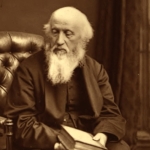I summon up Panofskv from his bed
Among the famous dead
To build a tomb which, since I am not read,
Suffers the stone’s mortality instead;
Which, by the common iconographies
Of simple visual ease,
Usurps the place of the complexities
Of sound survivors once preferred to noise:
Monkeys fixed on one bough, an almost holy
Nightmarish sloth, a tree
Of parrots in a pride of family,
Immortal skunks, unaromatically;
Some deaf bats in a cave, a porcupine
Quill-less, a superfine
Flightless eagle, and, after them, a line
Of geese, unnavigating by design;
Dogs in the frozen haloes of their barks,
A hundred porous arks
Aground and lost, where elephants like quarks
Ape mother mules or imitation sharks—
And each of them half-venerated by
A mob, impartially
Scaled, finned, or feathered, all before a dry
Unable mouth, symmetrically awry.
But how shall I, in my brief space, describe
A tomb so vast, a tribe
So desperately existent for a scribe
Knowingly of the fashions’ diatribe,
I who have sought time’s memory afoot,
Grateful for every root
Of trees that fill the garden with their fruit,
Their fragrance and their shade? Even as I do it,
I see myself unnoticed on the stair
That, underneath a clear
Welcome of bells, had promised me a fair
Attentive hearing’s joy, sometime, somewhere.



















Comment form: